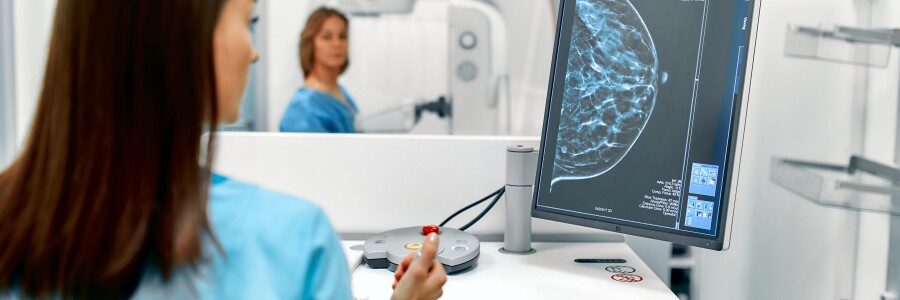A mammographer has a very important role in the lives of women, as mammography is the primary means of early detection of breast cancer.
Using low-dose x-rays, mammographers image breasts to help physicians look for or track the progress of cancer or benign growths and determine treatment. Mammographers may work in a hospital setting, private physician’s offices, or other healthcare facilities.
According to the U.S. Bureau of Labor of Statistics, nationally, employment of radiologic technologists, which include mammographers, is projected to grow 7 percent by 2029, which is above the average for job growth.1
Why Kent State University?
The new online Mammography Undergraduate Certificate program at Kent State University includes only 8 credit hours and can be completed in as little as 3 semesters!
The courses for the online Mammography Undergraduate Certificate at Kent State University will prepare the radiographer to be a member of the breast imaging team who provides patient education concerning breast cancer and early detection, takes the patient history and prepares the patient for the examination, selects the exam technical factors, positions the patient for the exam, evaluates the images for diagnostic quality, and performs and evaluates quality control procedures.
NEW PROGRAM! Enroll today in the Online Mammography Undergraduate Certificate at Kent State University
The online Mammography Undergraduate Certificate provides education and training in digital mammography. Mammography is specialized medical imaging that is critical to the early detection and diagnosis of breast diseases in women. Technologists, also known as mammographers, are members of breast-imaging teams within health care organizations. Using low-dose x-rays, mammographers image breasts to help physicians look for or track the progress of cancer or benign growths and determine treatment.
The Mammography certificate meets requirements set by the Mammography Quality Standards Act (MQSA) for minimum didactic and clinical standards for mammographers. Graduates of the certificate are eligible to earn certification in mammography from the American Registry of Radiologic Technologists (ARRT).
Graduates of this program will be able to:
- Effectively utilize critical thinking and problem-solving skills when performing mammographic procedures
- Communicate effectively in oral and written form with patients, families, and members of the health care team
- Perform mammographic procedures successfully and consistently with the entry-level requirements of a registered mammographer
- Determine the value of professional growth and development and conduct themselves in a professional manner
For more information on Kent State’s Mammography Undergraduate Certificate, visit https://onlinedegrees.kent.edu/degrees/certificate-mammography.
1 Retrieved on March 24, 2022, from https://www.bls.gov/ooh/healthcare/radiologic-technologists.htm




